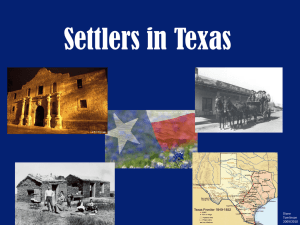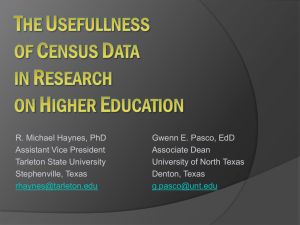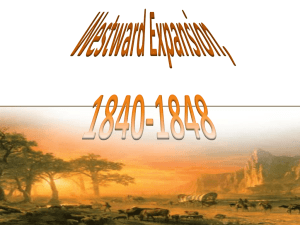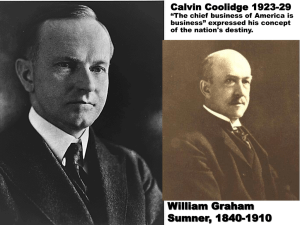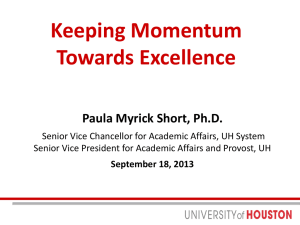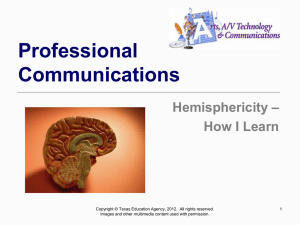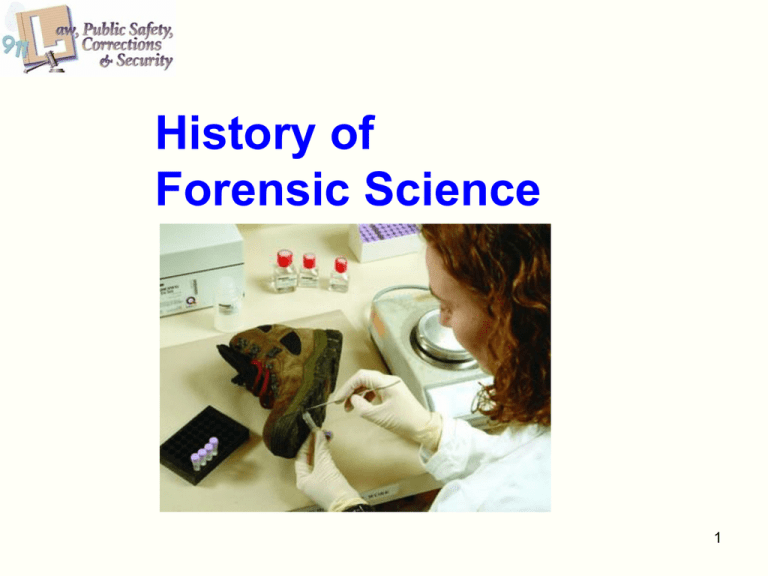
History of
Forensic Science
1
Copyright and Terms of Service
Copyright © Texas Education Agency, 2011. These materials are copyrighted © and
trademarked ™ as the property of the Texas Education Agency (TEA) and may not be
reproduced without the express written permission of TEA, except under the following
conditions:
1) Texas public school districts, charter schools, and Education Service Centers may
reproduce and use copies of the Materials and Related Materials for the districts’ and
schools’ educational use without obtaining permission from TEA.
2) Residents of the state of Texas may reproduce and use copies of the Materials and Related
Materials for individual personal use only, without obtaining written permission of TEA.
3) Any portion reproduced must be reproduced in its entirety and remain unedited, unaltered
and unchanged in any way.
4) No monetary charge can be made for the reproduced materials or any document containing
them; however, a reasonable charge to cover only the cost of reproduction and distribution
may be charged.
Private entities or persons located in Texas that are not Texas public school districts, Texas
Education Service Centers, or Texas charter schools or any entity, whether public or private,
educational or non-educational, located outside the state of Texas MUST obtain written
approval from TEA and will be required to enter into a license agreement that may involve the
payment of a licensing fee or a royalty.
Contact TEA Copyrights with any questions you may have.
Copyright © Texas Education Agency 2011. All rights reserved.
Images and other multimedia content used with permission.
2
Forensic Science
the application of science to the court of law
Criminalistics
the application of scientific techniques
in collecting and analyzing physical
evidence
Copyright © Texas Education Agency 2011. All rights reserved.
Images and other multimedia content used with permission.
3
Before 17th century
Confrontation by the accuser
Confession under torture
Strength to resist the pain
INNOCENT
GUILTY
1
Copyright © Texas Education Agency 2011. All rights reserved.
Images and other multimedia content used with permission.
4
Carl Wilhelm Scheele
• 1775
• Swedish Chemist
• Devised the test for
detecting the poison
arsenic in corpses
2
Copyright © Texas Education Agency 2011. All rights reserved.
Images and other multimedia content used with permission.
5
Alphonse Bertillon
• French Anthropologist
• Introduced the Bertillon
System (aka Anthropometry) in
1879
• Used various measurements of
the body to identify people by
their physical appearance
3
• Replaced by Fingerprinting
after the Will West case in 1903
Copyright © Texas Education Agency 2011. All rights reserved.
Images and other multimedia content used with permission.
6
Valentin Ross
• German Chemist
• 1806
• Discovered a more precise
method for detecting small
amounts of Arsenic
Mathieu Orfilla
•
•
•
•
Spain
1814
Father of Forensic Toxicology
Published the first scientific
treatise on the detection of
poisons
4
Copyright © Texas Education Agency 2011. All rights reserved.
Images and other multimedia content used with permission.
7
1828 –
The Invention of the
Polarized Light Microscope
5
1839 –
First microscopic
detection of sperm
6
Copyright © Texas Education Agency 2011. All rights reserved.
Images and other multimedia content used with permission.
8
James Marsh
• Scottish Chemist
• 1839
• The first to testify in a
criminal trial on the
detection of Arsenic in
a victim’s body
7
Copyright © Texas Education Agency 2011. All rights reserved.
Images and other multimedia content used with permission.
9
1863 –
The first presumptive test for blood
8
1850’s – 1860’s –
Development in photography and
Improved records in forensic science
9
Copyright © Texas Education Agency 2011. All rights reserved.
Images and other multimedia content used with permission.
10
Hans Gross
• Austrian prosecutor and judge
• 1893
• Published Criminal Investigation
10
• Discussed the benefits of science
(microscopy, chemistry, physics,
zoology, botany, geology and
fingerprinting) in criminal
investigations
Copyright © Texas Education Agency 2011. All rights reserved.
Images and other multimedia content used with permission.
11
Karl Landsteiner
• 1901
• Discovered ABO Blood typing
11
Albert Osborn
• 1910
• Published Questioned Documents
12
Copyright © Texas Education Agency 2011. All rights reserved.
Images and other multimedia content used with permission.
12
Edmond Locard
• 1877-1966
• French
doctor/criminologist
• Locard’s Exchange
Principle
• Opened the very first
crime laboratory in
France
Copyright © Texas Education Agency 2011. All rights reserved.
Images and other multimedia content used with permission.
13
13
Walter McCrone
• 1916-2002
• American chemist
• Microscopy expert
• Examined The
Shroud of Turin and
the Vinland map
14
Copyright © Texas Education Agency 2011. All rights reserved.
Images and other multimedia content used with permission.
14
History of Crime Labs in the United States
1923 –
Los Angels PD Crime Lab (the 1st crime lab in US)
1930’s –
University of CA at Berkeley Dept. of Criminalistics
headed by Paul Kirk
1932 –
FBI Director J. Edgar Hoover opens the FBI Laboratory
1981 –
FBI opens Forensic Science Research and Training Center
Copyright © Texas Education Agency 2011. All rights reserved.
Images and other multimedia content used with permission.
15
Federal Crime Laboratories
• FBI Laboratory (Quantico, VA)
• Drug Enforcement Administration (DEA)
Laboratories
• Bureau of Alcohol, Tobacco, Firearms and
Explosives (ATF) Laboratories
• U.S. Army Crime Investigation Laboratory
(Fort Gillem, GA)
• U.S. Postal Inspection Service Laboratories
Copyright © Texas Education Agency 2011. All rights reserved.
Images and other multimedia content used with permission.
16
Crime Labs Abroad
• The British Home Office
– Metropolitan Police Laboratory (London)
– 5 other regional labs
• Canada
– Royal Canadian Mounted Police (RCMP)
Laboratories
– Centre of Forensic Sciences (Toronto)
– The Institute of Legal Medicine and Police Science
(Montreal)
Copyright © Texas Education Agency 2011. All rights reserved.
Images and other multimedia content used with permission.
17
Resources
• Saferstein, Richard. Forensic Science: An Introduction.
New Jersey: Pearson Prentice Hall, 2008.
• Bertino, Anthony J. Forensic Science: Fundamentals
and Investigations. Mason, OH: South-Western
Cengage Learning, 2009.
• http://www.officer.com/publication/article.jsp?pubId=1&id=25192
Copyright © Texas Education Agency 2011. All rights reserved.
Images and other multimedia content used with permission.
18
Image Sources
1)
2)
3)
4)
5)
6)
7)
8)
9)
10)
11)
12)
13)
14)
http://theopinionation.net/blog/wp-content/uploads/2009/06/10-medieval-torturedevices8.jpg
http://www.nndb.com/people/492/000095207/carl-wilhlem-scheele-1-sized.jpg
http://www.all-about-forensic-science.com/alphonse-bertillon.html
http://www.fact-archive.com/encyclopedia/upload/thumb/a/a9/250pxMathieu_Joseph_Bonaventure_Orfila.jpg
http://img.directindustry.com/images_di/photo-g/polarization-microscope-304081.jpg
http://www.historyforkids.org/scienceforkids/biology/cells/pictures/sperm.jpg
http://en.wikipedia.org/wiki/File:Marsh_James.jpg
http://blog.bloodonthemotorway.com/wp-content/uploads/2009/10/Blood_Spatter.jpg
http://en.wikipedia.org/wiki/File:Marsh_James.jpg
http://www.gusto-graeser.info/Monteverita/Personen/GrossOtto/Hans_Gross.jpg
http://media-2.web.britannica.com/eb-media/75/68975-050-00CBB315.jpg
http://www.osbornandson.com/backgnd.html
http://www.bestforensicscienceschools.com/2009/top-10-most-famous-forensicexperts-in-history/
http://www.mcri.org/home/section/2-8/dr.-walter-c.-mccrone
Copyright © Texas Education Agency 2011. All rights reserved.
Images and other multimedia content used with permission.
19



